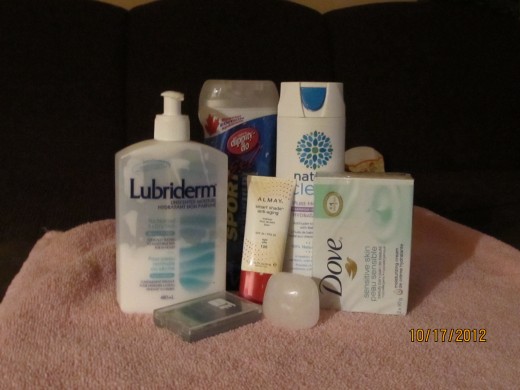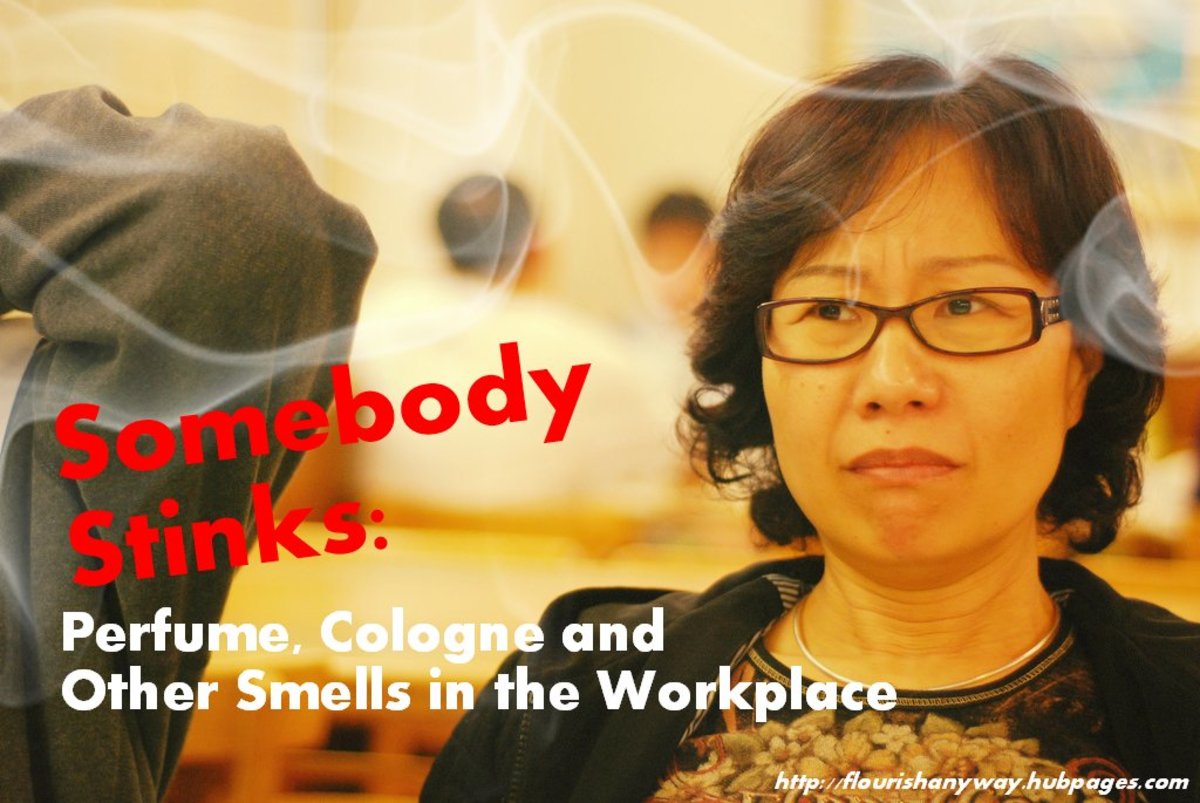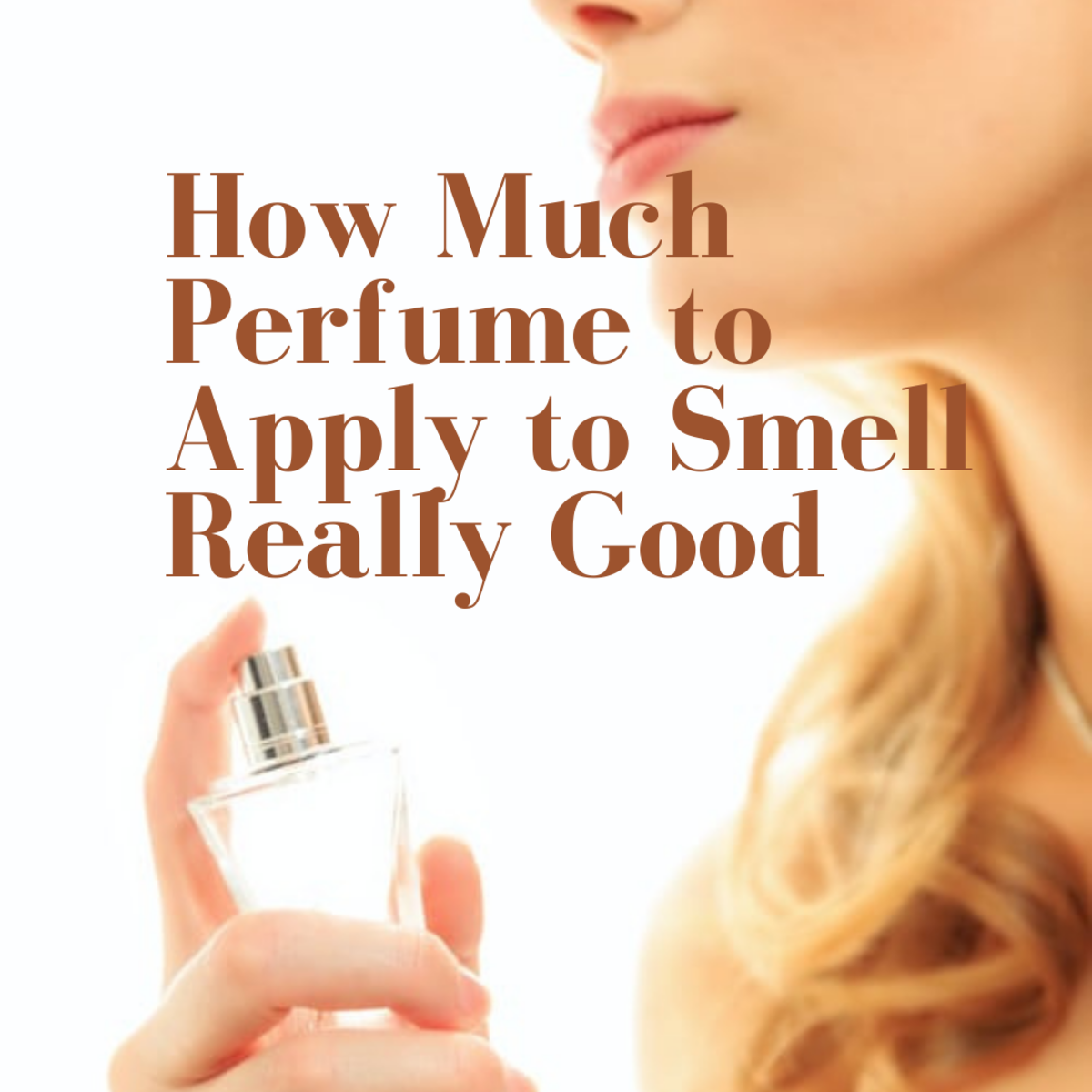Multiple Chemical Sensitivities
An "Invisible Disability"
It's part of my everyday existence. I get up and shower; I use "my" soap and "my" shampoo, and hope my kids haven't showered in the last 12 hours so that I can get through my shower without getting a headache. I put on "my" gel and style my hair, and put on my clothes that have been washed in "my" laundry detergent. I put on "my" antiperspirant.
When I get in the car, I know in an instant whether my other daughter's best friend sat in my seat because my eyes will start to sting from the left-over chemicals in her hair products. I reach for a tissue and breathe through it until the air conditioning removes the chemical scent from the inside of the vehicle.
At work, I slip into a traffic pattern which is least used by others on the way to the elevator. I get inside. Ughh. Today, sometime in the previous ten minutes, someone who sprayed her hair was in that small, enclosed space, leaving invisible clouds of toxic fumes behind - at least, they are toxic to me. I grope for my jacket lapel and breathe through it. If I don't, I will get a headache and might become disoriented if I stay there too long.
I turn down an invitation to go to a stand-up staff coffee party. I might go past the place prior to the gathering, or wander by after everyone has left - but the potential for exposure is too great, even though our office is supposed to be scent-free. It only takes one person wearing a product, even one that is "deodorizing" (often the worst offenders!) to make my nose stuff up, my eyes to sting, and my head to hurt.
I settle down to work. Someone drops a file off at my desk; he uses aftershave. A LOT of aftershave - like Old Spice or something. Since he came up behind me, I am unprepared and can barely breathe while he is there. I spend the next two minutes waving sheets of paper around to make the man-perfume dissipate more quickly.
And it's only 9:30.
Sigh.
I used to enjoy these scents. Now ... they make me sick ... and people don't even realize. Some of them, frankly, don't care.
I have a disability. It's called "Multiple Chemical Sensitivities" or MCS. It's been diagnosed by one of the foremost researchers on the topic, Dr. Roy Fox of the Nova Scotia Environmental Health Centre - and I have his recommendations on my employee file for accommodations at work. My bosses have tried to be supportive, but there is only so much that they can do. Our workplace has a scent policy, but until very recently, this policy was not enforceable, and my only recourse was making a formal complaint and naming names. That was NOT a good scene.
People don't realize that I have a disability. I have a poster by my desk, but it's become part of the woodwork. And to tell the truth, a lot of people don't really consider what I have to be a real condition. I'm not writing this article to argue whether it is or isn't. What I'm saying is that it's real to me.
I've learned a few things in the eight years since my MCS journey began. Perhaps what I've learned will help others with this condition, and just maybe, what I share here will help people who don't suffer from this debilitating illness to be a little more sensitive - not to scents but to those who are sensitive to scents.

Being sensitive is not the end of the world
Let me make this perfectly clear. I used to enjoy wearing perfume, using scented soaps, lotions, and other beauty AND CLEANING products. Now, I just can't.
I was exposed to what researchers in the field might call a "precipitating event." Hurricane Juan came roaring through this little province back in September 2003, and we got a lot of water in our basement. The restoration company came in and took out most of the carpet, but left one. And they left a couple of dehumidifiers, but it was too late. Mold crept in, and we began to get sick while the restoration company went to look after hundreds of other people whose homes had flooded as well.
That's when the symptoms started picking up. I'd always been allergic to tar fumes (cigarette smoke made me stuff up within 30 minutes) but this was ... more. I'd get headaches and a stuffy nose when people around me wore strong perfume. Church was fraught with peril. And some of the people at work were now unapproachable. These symptoms stayed at the same level for about four years.
And then (formerly Hurricane) Tropical Storm Hanna came and dumped much more rain on us than Juan had! This time, the water and mold damage were even greater than with Juan - nobody expected Hanna to be more damaging than a Category 1 hurricane. This time the mold went half-way up the drywall and paneling, and we had to replace our carpets. Again.
At that point, after we'd gotten all the restoration done, my symptoms became really severe. Five minutes' exposure to any kind of petroleum-based scent (which is what most scented products are made from) would give me a migraine. Then I'd become very disoriented, confused, unable to concentrate, and unable to take a full breath.
Except for work (and sometimes even that was impossible) I was pretty much housebound. I'd try to go to church, but very few people respected the scent-free policy because very few people knew exactly what scent included. Those who did were either of the opinion that it was all in my head, or that they only used "a little bit" so it didn't make any difference.
It was so bad that I had to start wearing a face mask to work and to church, on shopping excursions to the grocery store and especially to the pharmacy, where just inside the door, they had placed a display of all kinds of perfume and scented cosmetics.
Arrgh!
One young man, about 16 years old, saw me at church (this would have been in the early spring of 2009) and spoke to his mom about me. "I feel bad for her, Mom," he said, "she's dying." When pressed for the reason he thought so, he replied, "She's got swine flu, right?" His mom explained to him that I was sensitive to scents and that they made me very sick, and that's why I was wearing the mask. He was outraged. "Well then, they should stop! Why don't people stop, Mom?"
Why not indeed.
Today, I'm much better than I was then. That in itself is a long story, which I may talk about in another hub. However, I have learned a lot about how to raise awareness and advocate for not only myself, but others who suffer much more than I. I've compiled a list of lessons I've learned in the last four years especially, since my sensitivities got so bad.
Talk about it
"If you keep doing what you always did, you'll keep getting what you always got." This adage has been my mainstay in the quest to raise awareness. Telling my story, warts and all, has raised awareness for the illness and has also started some important conversations about policies at the macro level and products at the micro level.
Don't lie down and "take it"
Be honest about what you need with your employer, your family, your friends, your pastor or volunteer coordinator. Especially at work: if you need to get a doctor's recommendation for you to be "heard" - DO IT. Try to resist the temptation to blend into the woodwork. A friend of mine marveled at how outspoken I was about my problem, and told me that she could never do that. Yet, when she was facing the possibility of having to either work from home or resign, neither of which appealed to her, she found her voice - and now I am admiring her tenacity!
A word here - if at all possible, do your own talking. If you complain to a supervisor, there is no telling how your message will be conveyed to the person whose product is toxic to you. I tried telling my supervisor instead of talking to the offenders myself. I don't recommend that. Ever. Even a carefully worded email (if you can't get within 15 feet of the scented individual) would be better than another person possibly misunderstanding your intent and using your situation to feed a hidden agenda.
Take care of yourself
Looking after yourself is key because if you're always playing catch-up with your health, you won't be well enough or be strong enough to speak up when (not if) someone crosses the line - especially if that someone is one of the higher-ups. One of the best things I ever did was ask for a diagnosis from an MD. My family doctor referred me to Dr. Fox in Nova Scotia. Through the assessment process, I learned about the plethora of fragrance-free products that are available. The doctor suggested that I take about 300 mg of Magnesium Citrate per day, and possibly 450 mg. He also suggested that I take a multivitamin, not very strong but enough to give me a bit of a "boost." And finally, he recommended a Vitamin D supplement because I was low in that Vitamin in my blood work. I started taking these things. And I felt better. It took me more intense exposures for me to have a reaction because the magnesium - a chelating agent - was neutralizing the toxins in my system from all those poison petroleum-based chemicals like benzine and toluene, and from other compounds called aldehydes. Yes, like formaldehyde!
I started eating according to what the nutritionist at the center told me. She said that the Canada Food Guide is just that - a guide. Shorter people didn't need to have 5 to 12 servings of grains a day. Shorter people needed 2 to 5 per day. That was a revelation for me. I'm under five feet - guess what I'd been trying to do? Live on a diet that was designed for someone that was five foot six or taller.
If it gets bad, don't stay there
Leaving a toxic environment became a choice I made - even if I wanted to stay - that reminded me that I was more important than the expectations I had placed on myself. But before I left, I made sure that I told someone - even one person - about why I was leaving. Word gets around. And you would be surprised how many conversations it started afterward.
Tell them what they CAN do
Don't just complain with no recourse for those you are complaining about. It's the same as child-rearing - children behave better if they know WHY something is not acceptable and if you give them an alternative to the behavior. It's the same with people who are entrenched in their habits. Give them options. Talk about the products you use and their benefits. Give them websites if they ask for information - make it easy for them to discover new ways of thinking.
Never Give Up
It's easy to throw up your hands. Don't. The fight is sometimes frustrating, long, and hard, but there comes a time when you can see that light at the end of the tunnel and you know that you helped turn it on.
That feels good.








